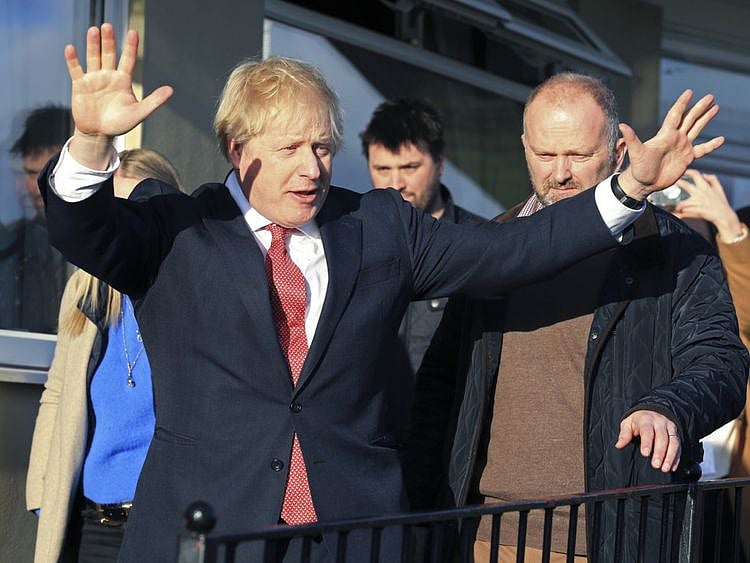Why Boris Johnson won’t 'get Brexit done' by January 31
Years of talks would follow that will shape international politics well into the 2020s

Boris Johnson stormed to a big election victory on Friday with a central slogan of “getting Brexit done” and avoiding the “chaos” of an anti-Conservative coalition championing a new EU referendum. Yet, Johnson’s key message is as misleading as it is simplistic, and he is hoodwinking UK voters.
While the prime minister implies leaving the EU next month — under the terms of the withdrawal deal he agreed with the EU-27 — will put an end to the UK’s Brexit saga, this is ‘pie-in-the-sky’. Far from concluding the more than three and a half year-long Brexit drama, leaving the EU with (or indeed without) a deal next month would only be the start of a new phase of negotiations that will help define UK and international politics well into the new decade ahead.
For even if Johnson now manages to get his withdrawal deal ratified in coming weeks, as is overwhelmingly likely, it will not trigger the ‘endgame’ of Brexit. Instead, the political saga will merely move to the next phase of negotiations from the Irish border, citizen rights, and the UK’s financial ‘divorce settlement’ from the EU, to a much broader range of stage two topics from transport and fisheries to financial services and data transfer which will collectively represent a new order of complexity. Take the example of converting the 600-page plus withdrawal agreement which will become much longer legal text if ratified and transformed into a free trade deal with many details the subject of long discussions. Even the approximately 25-page political declaration that top-lines the future EU-UK relationship, will require intense negotiation as it is translated into hundreds, if not thousands, of pages of legal documentation.
The current transition phase proposed from February 1 to the end of 2020 is therefore not likely to be nearly long enough. This despite claims to the contrary by Johnson and other leading Tory politicians like Sajid Javid who remarkably said last week that “there is not a single doubt in my mind [a final comprehensive deal] can be agreed within months, and we can get it through parliament in 2020”.
The long odds of this happening in practice, however, is one reason why some European politicians, such as Irish Foreign Minister Simon Coveney, have proposed a five-year transition period. This is reinforced by the EU’s chief brexit negotiator, Michel Barnier, who has said a “bare bones” agreement may be the best that can be hoped for in less than a year’s negotiations.
Stage two negotiation
The reasons why timeframes would be so tight in a 2020-only stage two negotiation is that Brussels is not allowed by law to conduct formal discussions on a new trade deal until after the United Kingdom has ratified a withdrawal deal, after which the EU-27 can approve a joint, next-phase negotiating mandate. That latter process could take weeks meaning formal discussions may not begin till Spring and, because a deal would need to be ratified, negotiations realistically need to be completed by Autumn.
Yet few in London nor Brussels are prepared to talk openly about the likely need for a transition extension, for now at least. For instance, Johnson made it a central election pledge not to extend the end-2020 deadline given that many -of his Brexiteer allies are opposed to making significant continuing payments to the EU, regardless of the benefits.
This threatens a new “cliff-edge” and what would, in effect, be a potential no-deal Brexit raising its head again. Only last week, Javid refused to rule out this scenario, threatening a re-run of the political and economic uncertainties of 2019.
If the reality of no-deal dawns in around a year’s time, both Brussels and London would almost certainly need to return to the negotiating table in the weeks that follow. But with a new set of incentives, and potentially urgency.
Outside a transition period, the negotiating process for a final, comprehensive deal could get significantly harder, with the same trade-offs as before, including that of free movement of people versus scope of access to the European Single Market, but with potentially added time pressure if the UK economy is hurting more than that of the EU-27. One factor that may make concluding a final, comprehensive UK-EU deal significantly more difficult is that — outside of the formal transition process which requires only a ‘qualified majority’ of states to ratify — EU-27 unanimity would be needed which risks just one European state blocking agreement.
Taken overall, Johnson’s “get Brexit done” slogan is therefore a huge distortion of the truth. Far from the UK’s EU exit being finished early next year, with or without a deal, potentially years of complex, detailed negotiations would follow that will shape UK and international politics well into the 2020s.
— Andrew Hammond is an Associate at LSE IDEAS at the London School of Economics.
Sign up for the Daily Briefing
Get the latest news and updates straight to your inbox
Network Links
GN StoreDownload our app
© Al Nisr Publishing LLC 2026. All rights reserved.